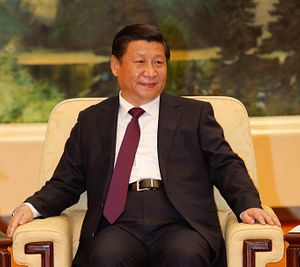Chinese nationalists in some quarters can barely conceal their huge sense of schadenfreude over the U.S. presidential election. It is almost as though the 2016 campaign were being conducted according to some secret script written in Beijing to prove the vagaries and risks of democracy. A candidate with zero experience in public office who has proved willfully creative with the boundary between falsehood and truth and who has made it a trademark of his campaign to vilify, insult, and offend almost everyone around him is now poised to be the Republican standard bearer, with every possibility of making it to the White House. The state owned Global Times and other outlets in China have pondered on the ways in which this sort of outcome would never happen in a system where things were managed right from the start — a system, for instance, like China’s, they say.
There is one part of Donald Trump’s message which might, however, give pause for thought in the corridors of power in Beijing. It is, fittingly, the part which seems largely to explain how he has come so far this year – the appeal to many Americans that he will make the United States great again. This is not a new theme for Trump; it is something he has been expounding on since the 1980s. But the way in which his complaints of U.S. decline and how it needs to be arrested have reached at least some of the electorate, generating support at the ballot box, is striking. Trump, many of those voting for him believe, will indeed make America great again.
One thing that China currently does seem to be fixated by is the idea that its moment of greatness is just over the horizon. The demise of the United States, which many in China see manifesting itself in these elections, happily coincides with China’s own ascent. Trump works into this narrative – the leader of a broken estate, heralding the moment for the next power-in-waiting to step forward. But before the Chinese and others who subscribe to this interpretation get too carried away, there is something else about the Trump phenomenon they need to think carefully about. Trump’s “make America great again” rhetoric exposes the chronic insecurity which seems to be endemic to those in the number one slot. Being a great power also means perpetually worrying about how long you can hold onto that position, how secure you are, and how soon before your inevitable demise starts staring you in the face.
Americans, after all, have been worrying about their decline for almost as long as Trump has been alive. In the 1960s, with the Vietnam War, they worried about their global role, and saw the final failure of this Southeast Asian adventure in the 1970s as the inevitable proof of their weakening. Nixon’s resignation, the pushiness of the USSR in the 1980s, and then the war against terror from 2001 on were all seen by many at the time as evidence that America’s days basking in the prime global economic and security slot were about to draw to a close. All these prognostications have, so far, proved over hasty.
It is worth wondering whether there was a single day since the end of World War II when Americans really did feel, at least at the time, that the country was living in a golden age, and that it was the global uncontested number one. Only in hindsight did such moments of comfortable assurance and confidence truly exist. At the time, the United States was always a worried power. Its dominance has never been as enjoyable to it as Chinese, in particular, often sound like they believe.
Xi Jinping sometimes speaks like a leader who is promising, overtly and covertly, that China’s moment of global greatness is only a few steps away. The China Dream, the national mission, the finale of Chinese modernity with its moment of primacy, is one of the biggest promises, and the greatest mobilizing asset, that Xi and his co-leaders have with Chinese people. The Communist Party, it is assumed, is the sole body that can deliver the delivery of this greatness – so, whether they believe in Marxism-Leninism or not, Chinese people should keep faith in the Party at least to achieve this. It almost seems like a matter of one day, in the future, the Chinese people going to bed as residents of an emerging power, and waking up the next day with Great Power status already upon them.
But before getting too lost in this inspiring dream, or feeling snug in the disapproval of the American travails at the moment, Chinese subscribers to the ideas about their imminent greatness described above might pause and wonder about what exactly this “great power” feeling might feel like if and when they reached the hallowed prime spot. And they might start to experience the very first pangs of anxiety over the transience of the position once they are in it, and the nervousness with which they will start to look at everyone around them and be afflicted by the question of who might be next after them and then their number one moment is coming to an end.
In Chinese politics, the worst position to be in has always been number two. In international relations, however, being number one is the trickiest. It carries endless obligations and worries. America’s experience over the last half a century proved that being number one often fails to deliver what was hoped of it. This would be a sensible conclusion in China from the Trump adventure unfolding in the United States, rather than any feeling of smugness and superiority.

































